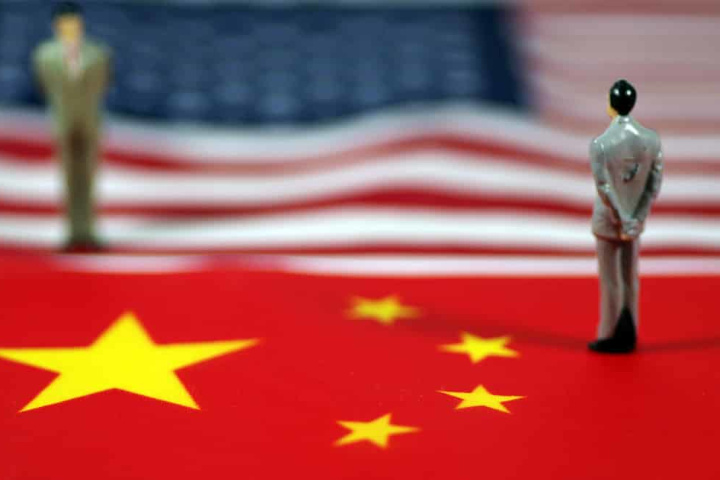
English version below
Nel 2001, gli Stati Uniti erano determinati a confrontarsi con la crescente potenza della Cina, ma la Cina fu salvata dagli eventi dell’11 settembre. La minaccia del terrorismo musulmano distolse l’attenzione americana dalla Cina per quasi due decenni.
Fu molto caro per l’America. Il piano americano di prendere il controllo dell’Afghanistan (il cuore del continente eurasiatico) e dell’Iraq, il nucleo del Medio Oriente, avrebbe potuto cambiare tutto per il mondo e per la Cina.
Se gli Stati Uniti si fossero radicati in questi due luoghi, avrebbero avuto in mano sia le rotte terrestri continentali sia i costi di produzione del petrolio. Il petrolio iracheno, uno dei più economici da estrarre, influenza il prezzo globale dell’oro nero. Se gli Stati Uniti ci fossero riusciti, la Cina avrebbe potuto essere costretta a piegarsi verso l’America, adottando ampie riforme politiche ed economiche.
La svolta della Cina avrebbe potuto influenzare anche la Russia. Tuttavia, il fallimento nel raggiungere questi obiettivi, a causa di una cattiva implementazione, obiettivi irrealistici e la conseguente crisi finanziaria del 2008, dimostrò alla Cina, e forse anche alla Russia, che l’America era in declino e non poteva realizzare le imprese europee e asiatiche del dopoguerra − ricostruire efficacemente paesi dalle ceneri.
Questa valutazione ha indirizzato la Cina, e forse anche la Russia, su un percorso diverso − di ignorare e sfidare il mondo guidato dagli Stati Uniti.
Il nuovo percorso cinese ha riconcentrato l’attenzione americana su Pechino, che nel frattempo era diventata sicura del suo brillante destino.
Le cose sono cambiate con il Covid e l’invasione dell’Ucraina. Gli USA hanno prodotto un vaccino efficace che ha salvato il mondo dall’epidemia e hanno previsto correttamente le intenzioni della Russia e la determinazione dell’Ucraina a resistere. Questi eventi hanno scosso la fiducia di Pechino.
Allo stesso tempo, il suo modello di crescita ha mostrato profonde crepe. Il settore immobiliare, principale motore dello sviluppo domestico, è crollato, eliminando ogni fiducia. All’estero, il lento processo di riduzione del rischio e di distacco dell’economia cinese dall’economia statunitense ha ridotto il commercio estero.
Inoltre, durante il Covid, molte imprese sono fallite. Quelle che sono sopravvissute avevano tutte abbastanza denaro da parte. Pertanto, dopo il Covid, nessuno spende; tutti risparmiano più di prima perché c’è una diffusa paura di possibili incidenti imprevisti. L’allarme ufficiale su possibili guerre con nemici non dichiarati rinforza questo senso di paura e la necessità di risparmiare. Tutto ciò porta a una ulteriore riduzione dei consumi e, quindi, della crescita, in un circolo vizioso.
Battaglia per il Tempo
In queste condizioni, la Cina guadagna tempo con una guerra che non solo non sta finendo in Ucraina, ma si sta diffondendo a Gaza e nello Yemen. La guerra a Gaza potrebbe finire in qualche momento tra marzo e aprile e ciò potrebbe riconcentrare l’attenzione israeliana sull’intero Medio Oriente.
Sicuramente, non si metterà fine al periodo di confusione. La Corea del Nord potrebbe creare ulteriori minacce, e una situazione di confusione potrebbe durare almeno fino alle elezioni presidenziali degli Stati Uniti a novembre.
Allora, se Joseph Biden sarà rieletto, le cose potrebbero rapidamente tornare alla normalità. Se Donald Trump sarà eletto, ci potrebbe essere un periodo di caos più lungo, coincidendo con i suoi piani di sostituire tutti i principali funzionari degli Stati Uniti. In ogni caso, in pochi mesi o un paio di anni, gli Stati Uniti potrebbero nuovamente stringere il cappio sulla Cina.
Pechino sembra già prepararsi a questo con una serie di mosse:
- Sta sviluppando mercati del terzo mondo come alternativa alle esportazioni del G7 (che costituiscono tutto il suo surplus) o come ponte per eludere le sanzioni statunitensi dirette o indirette.
- Pratica una «politica dei due forni» – trattare con tutti senza esigere la lealtà assoluta da nessuno. Questo approccio è accettabile per molti paesi non ansiosi di allinearsi esclusivamente con l’America ed è anche facile per alcuni uomini d’affari statunitensi desiderosi di fare soldi in qualsiasi modo possibile. Le richieste statunitensi di lealtà, non ricompensate economicamente (e forse non gratificanti), possono diventare più deboli.
- Continuare a esportare alcune tecnologie essenziali e beni capitali per produrre flussi di denaro. Queste misure, insieme a tensioni globali irrisolte, dovrebbero dare tempo a Pechino di attuare alcune modifiche domestiche più fondamentali.
- Chiudersi politicamente alle influenze esterne.
- Ravvivare il mercato interno aumentando la fiducia politica.
- Creare un sistema di welfare di base per fornire abbastanza fiducia nel mercato per stimolare il consumo domestico.
Tutto ciò potrebbe aiutare la Cina a superare alcuni anni difficili. Ma se la confusione all’estero e in America ed Europa continuerà a infiammare le cose, la Cina potrebbe alla fine uscirne meglio degli Stati Uniti.
La debolezza apparente di questo piano è che, in media, i cinesi diventeranno più poveri. Ma sono miti e non si ribellano. Inoltre, hanno qualcosa da perdere e non inizieranno una rivoluzione per paura di perdere il poco che hanno.
Paradossalmente, una Cina più povera e più impaurita potrebbe essere più facile da governare e potrebbe essere più stabile. I funzionari cinesi sono scontenti, ma anche loro temono di perdere i loro piccoli privilegi.
È un gioco aperto; gli americani conoscono la situazione e stanno reagendo rapidamente, legando tutti i nodi e girando i bulloni allentati di alleanze e accordi in tutto il mondo.
Il problema è che gli USA hanno dimenticato il loro raggio d’azione culturale e politico per oltre 30 anni. Questo è importante non solo fuori dagli Stati Uniti, ma anche all’interno.
L’America è dolorosamente divisa a livello culturale, sperperando così il suo capitale principale – il suo soft power che ha vinto la maggior parte della Guerra Fredda.
Al contrario, nell’ultimo decennio, la Cina ha messo insieme la sua struttura ed è in una forma migliore, politicamente, per affrontare la sfida.
Inoltre, in una situazione di caos diffuso, il consolidamento cinese è più facile da attuare rispetto all’America che cerca di portare ordine in tutto il mondo, dove si trova nel mezzo. Pertanto, la tentazione degli Stati Uniti, espressa da Trump, di abbandonare tutti a se stessi e chiudersi, in teoria, ha senso. Ma questa idea non riesce a vedere che l’America non è solo un paese; è un sistema globale. Se abbandona la sua portata globale, smetterà di esistere.
La Cina ora sta cercando di costruirsi al contrario come un sistema globale. Se gli Stati Uniti si arrendono, la Cina potrebbe sostituirli quasi senza sforzo, creando più problemi per gli Stati Uniti e i suoi alleati.
D’altra parte, a corto di una strategia complessa, cercando soluzioni facili e sentendosi assediati, l’America di Trump potrebbe spingere per un duro confronto con la Cina, spingendo alla escalation di una guerra distruttiva. Una guerra potrebbe risolvere il possibile problema urgente di Trump di governare un’America divisa.
La vera debolezza
La vera debolezza della Cina è che tutto è appeso a un filo. Quasi nessuno è veramente felice, ma tutti hanno qualcosa da perdere e non agiranno.
Le due possibilità non si sa quanto remote, sono di un’insurrezione armata interna o una guerra esterna. In entrambi i casi, indipendentemente dal risultato, ci potrebbero essere onde d’urto nella struttura domestica, innescando ulteriori shock. Pechino ne è consapevole e prevenire insurrezioni è una priorità. Ma per questo, ha bisogno di aumentare la repressione e incrementare la propaganda. Tutto ciò aumenterà l’entropia del sistema.
Ha bisogno di prevenire una guerra e perciò deve essere più aggressiva e anche questo di nuovo genera entropia e panico esterno. La Cina ha bisogno di rompere il circolo vizioso, ma per questo ha bisogno di un piano che apparentemente non c’è.
Al contrario, gli Stati Uniti come paese (non solo alcuni pensatori di Washington) hanno bisogno di un momento per rendersi conto di essere in un conflitto ampio. Questo potrebbe innescare un panico stile McCarthy degli anni Cinquanta difficile da gestire.
Ma non è impossibile; Washington alla fine ha trovato il giusto equilibrio nella Guerra Fredda e potrebbe trovarlo di nuovo. Certamente, la macchina americana è più difficile da gestire, mentre la struttura piramidale cinese appare più efficiente. Tuttavia, l’esperienza del Covid è un precedente interessante. La Cina, con la sua burocrazia competente, ha ottenuto un controllo completo all’inizio, ma poi l’America orientata al mercato ha prodotto un vaccino e ha fatto rimbalzare la sua economia molto prima della Cina.
Non è chiaro se sarà diverso nell’attuale scenario complesso.
Tuttavia, non è solo un gioco bilaterale. Se gli Stati Uniti non si metteranno in riga, l’Europa e l’Asia cederanno semplicemente sotto la pressione cinese o si opporranno? Finora l’Europa è divisa sull’Ucraina, e lo è anche l’Asia. La Russia, indipendentemente dal risultato in Ucraina, continuerà ad avere buoni rapporti con la Cina o cambierà rotta? È probabile che se l’America decidesse di ritirarsi, il resto dell’Asia potrebbe formare una nuova alleanza più aggressiva contro la Cina, e così potrebbe fare l’Europa contro la Russia. Ciò significa che le forze del caos potrebbero crescere esponenzialmente e andare fuori controllo.
Chinese Entropy and American Stumbles
In 2001, the US was set on dealing with the rising power of China, but China was saved by the events of 9/11. The threat of Muslim terrorism diverted American attention from China for almost two decades. It was very costly to America. The US’s plan to take control of Afghanistan (the Eurasian Heartland) and Iraq, the core of the Middle East, could have changed everything for the world and for China.
If the US had taken effective charge of these two places, it would have had a hold over both continental land routes and oil production costs. Iraqi oil, being one of the cheapest to extract, thus acts as a price setter for this crucial commodity. If the US had achieved that, China might have been forced to bend towards America, adopting sweeping political and economic reforms.
This turn by China might also have influenced Russia.
However, the failure to achieve these aims, due to poor implementation, unrealistic goals, and the ensuing 2008 financial crisis, proved to China, and possibly also to Russia, that America was declining and could not perform the post WWII European and Asian feats – effectively rebuilding countries from the ashes. This assessment set China, and possibly also Russia, on a different path, ignoring and challenging the US-led world.
The new Chinese path refocused American attention on Beijing, which, in the meantime, had become confident about its bright destiny.
Things turned around with Covid and the invasion of Ukraine. The US produced an effective vaccine that saved the world from the epidemic and correctly predicted Russia’s intentions and Ukraine’s determination to resist. These events shook Beijing’s confidence. At the same time, its growth model showed deep fissures.
The real estate sector, the main driver of domestic development, crashed, sapping all confidence. Abroad, the slow motion of de-risking and decoupling the Chinese economy from the US economy shrank foreign trade. Moreover, during Covid, many businesses were bust. The surviving ones had all enough cash saved up. Therefore, after Covid, nobody spends; everybody saves more than before because there is widespread fear of possible unexpected incidents. The official alarm about possible wars with unspoken enemies reinforces this sense of fear and the necessity to save. This all conjures up to further shrink consumption, and thus growth, in a vicious circle.
Battle for Time
In these conditions, China is gaining time with a war that not only is not ending in Ukraine but is spreading in Gaza and Yemen. The war in Gaza might end sometime in March or April and that would refocus Israeli attention on the whole Middle East. Surely, it will not end the time of confusion. North Korea could create more threats, and a situation of confusion could last at least until the US Presidential elections in November. Then, if Joseph Biden is re-elected, things could quickly move back to normal. If Donald Trump is elected, there could be a longer period of chaos, coinciding with his plans to replace all the US top officials.
In any case, in a few months or a couple of years, the US might tighten again its vise on China. Beijing is apparently already preparing for it with a series of moves:
- It is developing third-world markets as an alternative to G7 exports (making up all of its surplus) or as a bridge to circumvent direct or indirect US sanctions.
- Practice what Italians call a «two-stoves policy» – deal with everybody without demanding absolute loyalty from anybody. This approach is amenable to many countries not eager to align themselves exclusively with America and is also easy for some US businessmen keen on making money in any possible way. US demands for economically unrewarded (and perhaps unrewarding) loyalty can become weaker.
- Continue exporting some essential technologies and capital goods to produce cash. These measures, plus unresolved global tensions, should give time for Beijing to gear up some more fundamental domestic changes.
- Politically shut down to foreign influence.
- Rekindle the domestic market by boosting political confidence.
- Create a basic welfare system to provide enough market confidence to boost domestic consumption. It could help China steer through a few difficult years. But if confusion abroad and in America and Europe keeps on stirring things up, China could eventually emerge better off than the US.
The apparent weakness in this plan is that on average, Chinese people will grow poorer. But they are meek and don’t rebel. Moreover, they have something to lose and won’t start a revolution for fear of losing the little they have. Paradoxically, a poorer, more frightened China could be easier to rule and could be more stable. Chinese officials are disgruntled, but they too fear losing their small privileges.
It’s an open game; Americans know about the situation and are reacting fast to it, binding together all loose knots and bolts of alliances and agreements around the world.
The problem is that the USA forgot about cultural and political reach for over 30 years. This is important not only outside of the US but also within it. America is bitterly divided at a cultural level, squandering its main capital – its soft power that won most of the Cold War. Conversely, in the past decade, China has put its structure together and is in a better shape, politically, to face the challenge.
Plus, in a situation of widespread chaos, Chinese entrenchment is easier to implement than America trying to bring order to the whole world, where it stands in the middle. Therefore, US temptation, voiced by Trump, to leave everything outside to their own devices and close up, in theory, makes sense. But this idea fails to see that America is not just a country; it is a global system. If it abandons its global reach, it’ll stop existing.
China now is trying to build itself conversely as a global system. If the US gives up, China could replace it almost effortlessly, creating more troubles for the US and its allies. On the other hand, short of a complex strategy, seeking easy solutions and feeling under siege, Trump’s America might push for a tough confrontation with China, escalating it to a destructive war. A war could solve Trump’s possible pressing problem of ruling a divided America.
True weakness
China’s true weakness is that everything hangs by a thread. Almost no one is really happy, but everybody has something to lose and won’t act. The two odd possibilities are an internal armed uprising or an external war. Either case, no matter what the result, could send shockwaves through the domestic structure, triggering further shocks.
Beijing is aware of this and preventing insurgency is a priority. But for this, it needs to increase repression and ramp up propaganda. All of this will increase entropy. It needs to prevent a war, and to do this, it needs to be more defensive, aggressive and this again engender entropy and external panic.
China needs to break the vicious circle, but for this, it needs a plan that apparently is not there.
Conversely, the USA as a country (not only a few Washington’s pundits) needs a moment to realize it is in a broad conflict. This could trigger a 1950s McCarthy-style panic difficult to manage. But it’s not impossible; Washington eventually found the right balance in the Cold War and could find it again.
Surely, the American machinery is more difficult to manage, while the top-down Chinese structure looks more efficient. Still, the Covid experience is an interesting precedent. China, with its competent bureaucracy, accomplished a full control at first, but then market-oriented America produced a vaccine and bounced its economy back well ahead of China.
It’s unclear whether it’ll be different in the existing complex scenario.
Still, it’s not just a bilateral game. If the US doesn’t get its act together, will Europe and Asia simply buckle under Chinese pressure, or will they stand up to it? So far, Europe is divided on Ukraine, and so is Asia. Will Russia, no matter what the result in Ukraine, continue being on good terms with China, or will it turn around? Chances are that if America were to decide to withdraw, the rest of Asia could form a new, more aggressive alliance against China, and so could Europe against Russia. That means the forces of chaos could exponentially grow out of control.






At the end of the Second World War US had half the industrial production of the world, the largest air force and navy, most of the best scientists and huge financial power. It used its advantages to establish the Pax Americana and fought scores of wars to maintain it killing many millions of people.
China has now an industrial production three times as large as US. A recent article in Nature showed that US has three of the ten best universities in the world, the other seven being Chinese. China’s infrastructure is still developing, most noticeably its high speed railway system, and that of US continues to be neglected.
China was the last time at war in 1979 while US has vastly experienced armed forces, by far the most expensive in the world, but has lost most of its wars since 1950 – spectacularly those against Vietnam and Afghanistan. When Russia intervened in Ukraine the equipment and plans it provided to that country failed and the war is now nearing its end. The Houthis are preventing the passage of US merchant ships into the Red Sea and the US Navy is unable to adequately protect them.
Large US dollar reserves were necessary to countries to maintain international trade, which enabled US to import a much larger value than it exports. David Goldman described in an article in Asia Times the way in which using 5G this trade will be much more cheaply financed using RMB. We already see that US government debt is now largely financed by the Fed because parties outside US have enough. While officially US still has a growing economy the ordinary people are getting poorer. And while China’s economic grows is low it is still much larger than that of US.
There is an old Dutch saying about someone who is not very bright: He didn’t invent gun powder. The Chinese did and guns and rockets. They are now developing molten salt nuclear reactors. A design for a large container vessel powered by such a reactor so doubt intended for use between China and Rotterdam through the Arctic Ocean was recently approved by Det Norske Veritas. Similar reactors produce heat hot enough to replace the coal fired steam generators in the modern power stations China is building at a large scale as was promised some ten years ago when those power stations started building.
With a largely healthy and modernizing economy China has the leeway to stay ahead of US. Not to replace US – it has seen how damaging the Pax Americana was to the world and to US itself so it will not try to become a hegemon. And why should it when there is a queue of countries wanting to become members of BRICS+.